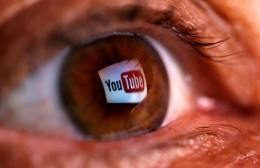YouTube disables ads on channels with less than 10,000 views.
 On April 6, 2017, the YouTube administration announced that channel owners with less than 10,000 cumulative views will no longer be able to advertise in their videos for the YouTube Partner Program (YPP) partner program. This program has been operating since 2007 and since then has become the main source of income for many authors, and even made some of them famous.
On April 6, 2017, the YouTube administration announced that channel owners with less than 10,000 cumulative views will no longer be able to advertise in their videos for the YouTube Partner Program (YPP) partner program. This program has been operating since 2007 and since then has become the main source of income for many authors, and even made some of them famous.Almost from the very beginning, the cheaters began to exploit the affiliate program, and the YouTube administration finally paid attention to them. She says that by now the company has closed "hundreds of thousands of channels breaking the rules." Apparently, this is not enough, and violations continue on a large scale. So now for reinsurance the rule of the minimum number of views is accepted. The administration believes that 10 thousand views are enough to determine if the channel is breaking the rule or not. At the same time, such a minimum limit ensures that the restriction does not affect really valuable partners who create high-quality content. It is important to emphasize that the restriction is not retroactive, that is, no one will take the previously earned money from channels with less than 10 thousand views.
In the near future, a special system of moderation of channels will be put into operation, which scored 10 thousand views and claim to be included in the affiliate program. As long as the moderators do not verify that the channel complies with the rules, no ads will be shown on it.
The Feinberg Revolution
 Why has YouTube decided to tighten the rules for participation in the affiliate program? The reason for this is the modest marketer Eric Feinberg, whose company Gipec (Global Intellectual Property Enforcement Center), by the way, in December 2016 received a patent for "a computerized system and a method for identifying fraudulent and malicious enterprises." Feinberg "invented" an automatic search engine for sites and videos that correspond to hate groups and communities, using keywords like "kill the Jews." He actively published links and screenshots of such sites and videos on YouTube, which successfully earn money by placing advertisements, including well-known brands.
Why has YouTube decided to tighten the rules for participation in the affiliate program? The reason for this is the modest marketer Eric Feinberg, whose company Gipec (Global Intellectual Property Enforcement Center), by the way, in December 2016 received a patent for "a computerized system and a method for identifying fraudulent and malicious enterprises." Feinberg "invented" an automatic search engine for sites and videos that correspond to hate groups and communities, using keywords like "kill the Jews." He actively published links and screenshots of such sites and videos on YouTube, which successfully earn money by placing advertisements, including well-known brands.')
This caused a real revolution among advertisers. They were literally accused of financing terrorism, racism, fascism and other sins.
Mr. Feinberg did not conceal that he hoped to sell / license his technology to automatically detect "hateful" content by Google or other companies. To this end, he fanned scandals and showed examples of companies that are advertised in racist and other disgusting videos. In the US, companies are very afraid of such charges. One by one, large advertisers suspended their advertising campaigns in order not to accidentally get into a scandalous story.
As a result, YouTube was forced to tighten the verification of the content on which advertising is placed. Google has promised in an official blog that it will recruit more people into the staff who will monitor compliance with the rules in order to prevent ads from appearing on pages with inappropriate content. But Mr. Feinberg says that Google won't succeed unless they violate its patent for automatically searching for specific phrases that incite hatred.
Experts doubt that the “inventor” will be able to prove the viability of his patent in court, because content checking for compliance with the rules is a normal and natural activity of companies, and such monitoring on YouTube has been carried out since at least 2015. But Feinberg still thinks that it makes sense for Google and other companies to license its technology, because over the years it has “compiled a database of thousands of words and phrases that are associated with vile activity.” For example, one of these words is the Serbian word “hanwa”, which correlates with the activity of jihadists.
Fight evil
The businessman sets a goal not only to make money on a patent, namely, to end this “vile” activity on the Internet, and therefore offers to license the technology not to advertisers, but to the sites that host the content.
Interestingly, Eric Feinberg himself is not associated with the Internet advertising industry, search technology or IT. For many years he was involved in advertising sports events, combating counterfeit sports paraphernalia, etc. But two years ago after a terrorist attack at the editorial office of the Charlie Hebdo newspaper, he drew attention to the activity of “hate groups” on the Internet. The fight against this evil has become the main business of Feinberg.
His activity led to unexpected consequences. Now, YouTube has disabled advertising on channels with less than 10 thousand views - one could hardly have expected such a move (although YouTube says that it planned it back in November). According to the Internet company Pex, approximately 164.5 million channels or 88% of all channels have less than 10 thousand views, although they gave less than 5% of the total number of 13.2 trillion views on YouTube for all time.
Some believe that from the side of YouTube is just a brilliant move. They disconnected 88% of channels from advertising, that is, they got rid of 88% of problems in one fell swoop. Advertisers pay for advertising on YouTube from $ 7 to $ 10 for 1000 views, so from a financial point of view, the authors have lost not so much money, Google’s losses will not be too serious either.
Source: https://habr.com/ru/post/403021/
All Articles